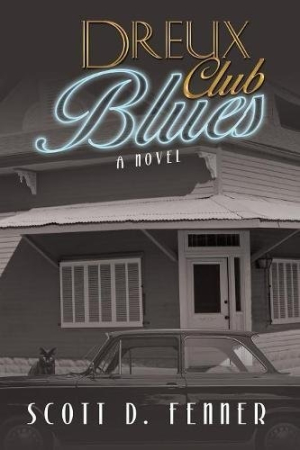Dreux Club Blues
By centering on a career officer who’s worked almost every district of the city, the book offer a bird’s-eye view of just about every situation imaginable in New Orleans.
Scott D. Fenner’s historical novel Dreux Club Blues brings a local’s eye and a double load of anecdotes to a New Orleans that most tourists never see.
The Dreux, a private social club in New Orleans that dates back to 1900, is the gathering spot for a colorful group of locals who swap stories, bond over long necks, and generally escape the stress of daily life. The novel is set during the 1970s and 1980s, with Dave, its narrator, nearing the end of his time on the New Orleans police force. He has more than the usual accumulation of memories to choose from. The book is a freewheeling stream of reverie that blends Dave’s on-the-job anecdotes with tales of his friends at the club.
The Dreux is a character in itself, a battered lair lurking behind a one-way mirror door. To enter, aspirants have to be assessed, approved, and buzzed in by the regulars. Anyone who’d make it through the rope line at Studio 54 probably wouldn’t pass muster with Gertie, Jerry the Satisfier, the bartender Barry or, for that matter, Fantome, the resident cat. Anecdotes that don’t involve the bar’s regulars draw from an equally rich pool of police officers, lawbreakers, and residents of New Orleans.
The writing is sharp. Dave’s voice is a treat to read—a mix of smart-alecky wit, a nice guy’s fondness for humanity, and the slangy cadences of cop speak. At the end of a night of drinking and gusting laughter, Dave observes that his friend Gertie’s lipstick “looked like it had been applied with a shoe.” When introducing his police partner, Baldomero Jose Wong Jr., he wonders, “My God … junior? Do you mean there were two of them?”
Dave’s years on the force, drawn from the author’s personal experience, show in the many anecdotes that realistically describe his day-to-day police work. Forget cinematic car chases and headline-making drug busts—you’re more likely find yourself following a trail of discarded clothes to a publicly naked prostitute or arresting the abusive man of the house whose girlfriend’s son quickly lays claim to the extra pork chop. By centering on a career officer who’s worked almost every district of the city, the book offer a bird’s-eye view of just about every situation imaginable in New Orleans, with Mardi Gras celebrations thrown in for good measure.
By design, there is no overarching plot, and anecdotes are not presented in any particular order. One reminiscence leads to another, sometimes punctuated by conversations going on at the Dreux and sometimes not. As anecdotes pile up, they begin to seem repetitious and claustrophobic. The book is best read in small bursts so that its language, characters, and unique incidents can be savored. Despite the purposeful lack of plot, the book has an apt, bittersweet, and satisfying end.
Dreux Club Blues captures the casual aimlessness of the years between Vietnam and the first Gulf War, serving as an ode to dearly departed neighborhood bars and offering a realistic view of police work.
Reviewed by
Susan Waggoner
Disclosure: This article is not an endorsement, but a review. The publisher of this book provided free copies of the book and paid a small fee to have their book reviewed by a professional reviewer. Foreword Reviews and Clarion Reviews make no guarantee that the publisher will receive a positive review. Foreword Magazine, Inc. is disclosing this in accordance with the Federal Trade Commission’s 16 CFR, Part 255.

